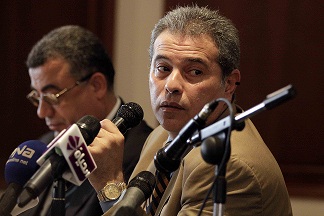Al-Faraeen channel, owned by TV host and former MP Tawfik Okasha, announced Wednesday that the channel will stop broadcasting permanently, offering it for sale.
“The channel’s board of directors decided to freeze its activities and end the channel’s business,” a statement broadcast on the channel read. It concluded with “thanks to President Abdel Fattah Al-Sisi.”
This comes ahead of a meeting scheduled for the Free Media Zone, which was expected to result in the decision to shut down the channel. A similar decision issued last December suspended Okasha from hosting programmes on the channel for three months.
Okasha’s parliamentary membership was officially dropped Wednesday, through the voting of MPs in majority in favour of cancelling Okasha’s membership. At least two-thirds of the members must approve the decision, which meant that nearly 400 MPs needed to vote in order to pass such a decision.
The voting on Okasha’s membership resulted in 465 members supporting his expulsion. Local media report said he had attempted last-minute apologies but was prevented by security from entering the session during voting procedures.
Okasha, usually a source of public controversy due to his media discourse which might be viewed as offensive, has caused debates inside the recently elected parliament.
The latest of his incidents sparked parliamentary anger, which then escalated and resulted in dropping his membership. Last week, Okasha surprised the public with a meeting with the Israeli Ambassador to Egypt, raising a debate on the normalisation with Israel, rejected by Egyptians despite diplomatic ties guaranteed by Egypt-Israel peace treaty.
Parliament Speaker Ali Abdul Aal repeatedly stressed upon their respect for international treaties signed with other countries, thus using the phrase ‘meeting with an ambassador of a foreign country,’ when making a statement on Okasha, and refusing to put relations with Israel at the core of MPs discussions.
An investigative committee assigned by Abdel Aal to interrogate Okasha, found him ‘guilty’ of three actions. First, the committee said that Okasha was being penalized for holding an important meeting with the ambassador of a foreign country, and admitting before the committee that the meeting took place without prior notification the parliament.
Second, Okasha discussing matters related to Egypt’s national security and sovereignty, namely the Renaissance Dam issue with Ethiopia, which he confirmed on TV. The parliament considered such talks to fall out of Okasha’s responsibilities and tasks as an MP.
As so, the committee said Okasha disrespected the principle of separation between different state powers, assaulting the executive power with his action. The committee said Okasha allowed himself to act in the name of the state, entitling himself to authorizations he does not legally possess.
Finally, the committee said the nature of the topic discussed by Okasha with the Iraeli ambassador relates to Egypt’s top national affairs, adding that Okasha jeopardized the country’s sovereignty and position in negotiations over the Renaissance Dam, by asking Israeli to ‘interfere in favour of Egypt.’
There were other topics discussed such as the construction of schools, also considered by the committee as unauthorized intervention by Okasha into national affairs.
The notorious Okasha was among the most controversial TV hosts in Egypt. Recently, he claimed to have been manipulated by state security authorities which have then turned against him.
He enjoys popularity among the popular social class, which contributed to his election as an MP with nearly 70,000 votes, the highest recorded vote number in the latest elections.
Okasha took his provocative attitude with him to the parliament, starting debates since the very first parliamentary session held last January.
A quick overview
On 2 March 2016, a two-thirds majority of the House of Representatives voted to permanently expel Tawfik Okasha’s from parliament on Wednesday.
In February 2016, the parliament decided to ban Okasha from attending 10 parliamentary sessions in a measure penalising the “disrespect” of the parliament.
MP Kamal Ahmed assaulted Okasha and hit him with a shoe after meeting the Israeli ambassador. Okasha was ejected from a parliamentary session after a scuffle with Parliamentary Speaker Ali Abdel-Al and was later summoned for investigations by the parliament.
In December 2015, Okasha was suspended and banned from appearing on the channel’s other programmes for three months following an order issued by the Media Free Zone’s administrative council.
In August, Okasha was arrested to implement judicial verdicts issued on him in a number of cases.




